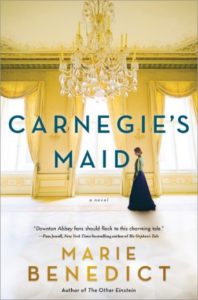Having enjoyed Benedict’s first novel, The Other Einstein, I was thrilled to be invited to read Carnegie’s Maid. Benedict has a flair for historical fiction paired with daring and inspiring heroines.
Summary
In the industrial 1860s at the dawn of the Carnegie empire, Irish immigrant Clara Kelly finds herself in desperate circumstances. Looking for a way out, she seeks employment as a lady’s maid in the home of the prominent businessman Andrew Carnegie. Soon, the bond between Clara and her employer deepens into love. But when Clara goes missing, Carnegie’s search for her unearths secrets and revelations that lay the foundation for his lasting legacy. With captivating insight and stunning heart, Carnegie’s Maid tells the story of one lost woman who may have spurred Andrew Carnegie’s transformation from ruthless industrialist into the world’s first true philanthropist.
Review
 (Disclaimer: I received this free book from Netgalley. This has not impacted my review which is unbiased and honest.)
(Disclaimer: I received this free book from Netgalley. This has not impacted my review which is unbiased and honest.)
Benedict knows how to get me every single time. I was captivated by The Other Einstein and her turbulent struggles. It was no different with Carnegie’s Maid. With this book, I knew vastly less than I knew about Einstein – which isn’t really saying much at all. But Benedict was able to not only portray the character of Clara – his mother’s servant – but also the Carnegie family.
While in some ways, this story seems almost fairy-tale like, it was intriguing until the very end. Because real life is never like the stories. Inspired by Benedict’s own family history, Benedict is able to bring a genuine quality – a starkness and vividness – of the poverty and perils of the time. These qualities seemed even more lifelike and moving in Carnegie’s Maid as Benedict illustrates how Clara got to where she was, and the struggles her family faces.
Clara herself is such a fascinating woman – she is resourceful, talented, and loyal. At the same time, she is ambitious and a realist. She realizes that this midway point between servant and lady is something she cannot straddle forever and it alienates her to be the servant to the lady of the house. I could empathize with her so deeply and that’s what made this book so gripping until the end. It wasn’t a thriller, but I had the similar feeling of fear not knowing how it would end.
Check out Carnegie’s Maid on Goodreads.
I’ve really been loving the 1900’s time period again, as well as the 1700’s ( I blame Hamilton).
YES! I want way more historical fiction
I may be nitpicking but, being from west of Ireland, I can say for sure that no Irish person of that era, or indeed until the advent of television, called parents “Mum” or “Dad”. It would have been “Mammy” or “Daddy” or else “my mother” or “my father”.
Ohh interesting, that’s definitely something to note. Yeah for terms like that I can never tell if it’s like historically accurate!